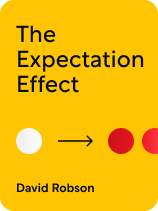

This article is an excerpt from the Shortform book guide to "The Expectation Effect" by David Robson. Shortform has the world's best summaries and analyses of books you should be reading.
Like this article? Sign up for a free trial here.
Are you interested in expectation effect psychology? How do your brain’s expectations affect your body?
Because of the connection between your body and your mind, both physiological and psychological mechanisms can produce expectation effects. In The Expectation Effect, David Robson explores how expectation effects affect your health and how you carry out tasks.
Keep reading to learn about the inner workings of expectation effects.
How Common Physiological Expectation Effects Work
In psychology, expectation effects occur when beliefs exert an influence over your well-being. We’ll look at the mechanisms that make physiological expectation effects work. While your brain is involved in all of these processes, they’re powerful because of the way they influence your brain to interact with other systems in your body.
Expectation Effects Kickstart Healing Processes in the Brain
According to Robson, one way that expectation effects work is by prompting your brain to initiate a response that makes the expectation a reality. For instance, if you’ve been injured, the body will start to heal when your brain tells it that you’re safe. Receiving treatment, even if it’s a placebo, makes you feel safe, and that can signal to the brain that it’s time to start the healing process.
Expectation Effects Prompt the Brain to Send Signals That Affect the Entire Body
Expectation effects also influence what the brain communicates to the body. Robson explains that positive expectations prompt your brain to release rewarding or pain-reducing chemicals like dopamine and opioids. Negative expectations inhibit the release of neurotransmitters that reduce stress or pain and instead prompt the release of chemicals that increase these feelings. The effect of these signals isn’t localized to your brain but influences your whole body. For example, if you expect to get sick, that prompts your brain to release hormones and neurotransmitters that act as signals to your immune, circulatory, and digestive systems. These chemicals might increase inflammation, change your blood pressure, or induce nausea, so that you feel sick as a result of expecting to feel sick.
Even longer-term expectations set these processes in motion. When we feel anxious about getting older, the stress triggers chronic inflammation, which increases risk for many illnesses. People with more negative beliefs about the decline they’ll experience as they age also tend to have shorter telomeres, which means that stress about aging damages your DNA and may even make you more vulnerable to disease as you age.
Expectations Trick the Brain
Robson reports that expectation effects also interfere with how your brain calculates limits and regulates resources. When setting your physical limits, the brain tries to use signals from inside your body, but your expectations can override even simple indicators like your temperature. For example, when cyclists were told that their body temperature was lower than it was, their stamina improved—thinking their body temperatures were lower made them expect to be able to ride further, and that expectation outweighed the reality of their actual body temperatures.
A related effect occurs with mental focus. Some researchers think the brain methodically allocates glucose, its fuel, and that your expectations influence these choices. If you think your resources are limited, your brain reduces glucose consumption after strenuous activity. If you think your resources are unlimited, your brain doesn’t limit the use of glucose. In this way, your expectations for how long or well you can focus become reality.
How Common Psychological Expectation Effects Work
Sometimes, expectation effects come about because of primarily psychological processes. These mechanisms can produce effects throughout the body, but it’s the way that they work with your psychology that makes them powerful.
Expectation Effects Tap Into the Social Brain
First, expectation effects can amplify effects of the brain’s basic functions, like how it’s attuned to social information. Robson explains that your susceptibility to social contagion is built into your brain. Because of the brain’s mirror system, which helps you understand what other people are doing or feeling, you start to feel unwell when you interact with someone who’s sick. A similar effect occurs when beliefs become contagious. People communicate their opinions about you not just overtly, but also subtly, like with their answers to your questions. You internalize these expectations, and they affect your beliefs about what you can or can’t achieve. These beliefs then determine your reality.
(Shortform note: We’re susceptible to social contagion because of the way our brains understand other people. In Mirroring People, neuroscientist Marco Iacoboni explains that specialized brain cells called mirror neurons enable us to understand other people’s actions, emotions, and intentions by inwardly imitating their actions and then simulating the underlying emotion or intention. Experts think that these neurons are one reason why we experience emotional contagion, and seem to “catch” other people’s emotions or beliefs, even without being fully aware of it.)
Expectations Influence Our Response to Emotions
Expectation effects also come into play with our emotional responses to what we experience. In this way, your limits in intelligence and creativity are mediated by your expectations. Robson explains that if you expect to feel frustration during the learning process, then feeling frustrated with a challenging task can help you persevere. But if you view frustration as a signal that you aren’t cut out for the task, then frustration might prompt your brain to tell you to give up.
(Shortform note: Many theories about intelligence and creativity support Robson’s argument that these aren’t set in stone. One theory is that we have both fluid and crystallized intelligence: The former involves the ability to think flexibly and creatively, and the latter involves knowledge and skills you acquire over time, and you can improve both with effort and practice.)
Similarly, when you encounter a stressful situation, your brain assesses your readiness and plans a response. Stress helps or hinders this response: If you believe that stress will hurt your performance, then it will. If you believe that stress can enhance your performance, then it will. (Shortform note: Experts note that manageable stress can increase your alertness and performance, with the caveat that there is such a thing as too much stress. In Brain Rules, biologist John Medina explains that stress even interferes with your brain’s ability to learn because the high levels of adrenaline and cortisol that accompany chronic stress can depress the health of your neurons.)

———End of Preview———
Like what you just read? Read the rest of the world's best book summary and analysis of David Robson's "The Expectation Effect" at Shortform.
Here's what you'll find in our full The Expectation Effect summary:
- Why you should rely on your body, not the universe, to make you happier
- How your brain can control your health, longevity, and quality of life
- Why you should focus on the benefits of getting older, rather than fearing it






